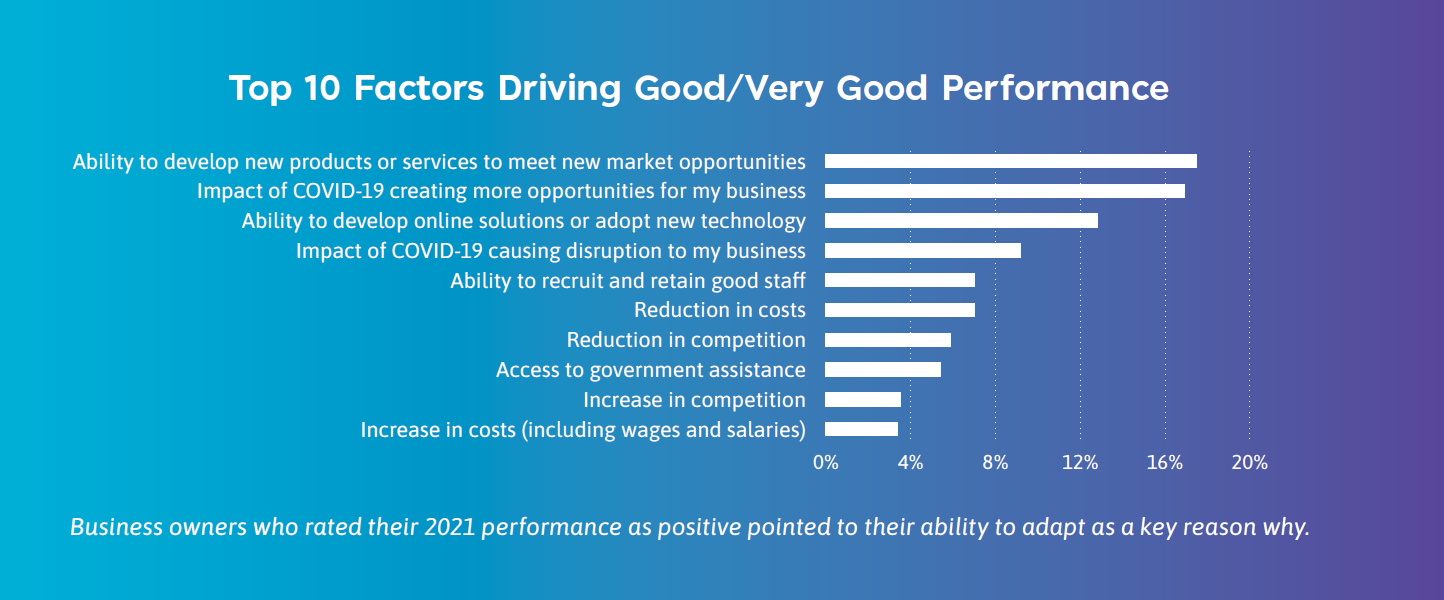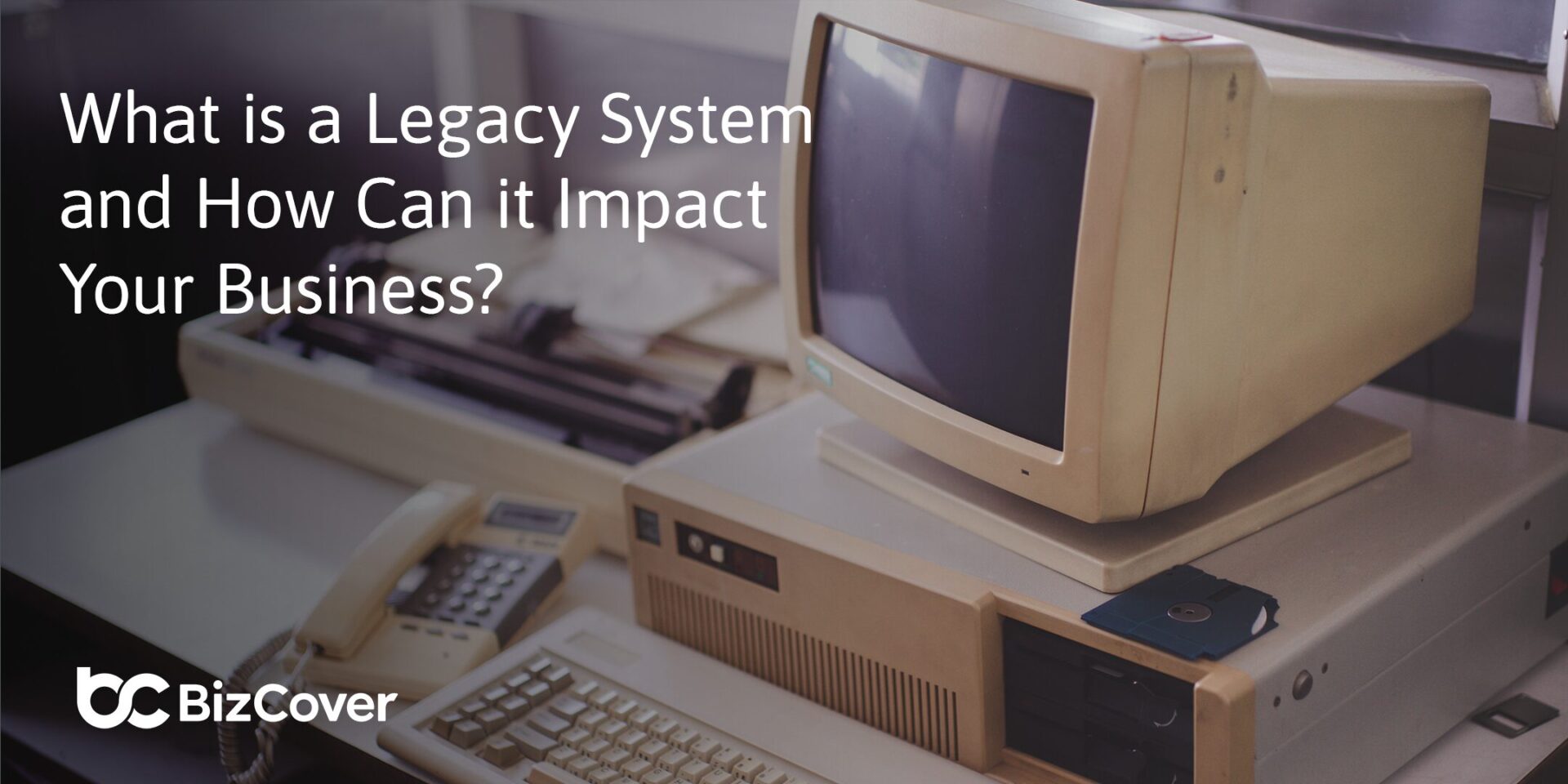The bravery beneath the surface in Australia’s small businesses
To learn more about how Australian business owners plan to recover and grow in 2022, download the 2022 Small Business Bravery Report
Starting a small business is an act of courage. Keeping one afloat through the uncertainty and operating restrictions of a global pandemic takes that commitment to the next level. And that’s what Australia’s 2.4million+ small business owners have shown over the past two years.
According to BizCover’s 2022 Small Business Bravery Report, almost one in two Australian small businesses say their performance was good or very good in 2021 – despite the impact of multiple lockdown periods and supply chain and labour shortage issues.
What’s telling is that those businesses impacted the most were also amongst the most optimistic about their future. In Victoria, 49% of business owners agreed their performance was good or very good in 2021. And 63% feel positive about their business in 2022, with one in four saying they are very optimistic they will grow.
“Small businesses are going to be a lot more robust. They have had to become more resilient, agile and innovative to survive the last couple of years, and they will be more prepared to take on new challenges,” says BizCover CEO Michael Gottlieb.
“This includes everything from planning for future COVID responses to cash flow to recruitment. I think we will continue to see more innovation from these businesses as they strive to take on changing market conditions.”
When Australia’s largest online small business insurer surveyed 1,327 SMEs in early 2022, it expected to capture the economic challenges for this sector. But what emerged was a story of resilience and hope. Having weathered the storm and shown themselves what they are capable of, small business owners said they feel confident they can continue to adapt and grow.
Learning to adapt
Challenging conditions showed many business owners they had the capability – and courage – to adapt in the face of adversity.
A fitness trainer in South Australia said their industry was “massively impacted by restrictions.”
“I’ve managed to keep my business afloat through the two years of the pandemic by pivoting my business model as restrictions changed. I offered options for clients who lost their jobs so they could still train without it negatively impacting their finances, I worked with other fitness professionals and small businesses to support each other and our clients in this time. I’m doing my best, and I think that’s bloody brave.”
The top three factors driving a positive performance in 2021 all relate to an ability to adapt or respond to new opportunities.
Almost one in four business owners (23%) said they developed new products or services to meet market opportunities, while 17% were able to develop new online solutions or adopt new technology. And 21% said COVID actually created more opportunities for their business.
With no choice but to adapt, and a sense of urgency to respond, these businesses have learned what their teams are capable of – and what their customers really value. And that is giving them more confidence in their business future.
Across Australia, 38% of owners are cautiously optimistic their business will grow or recover, while 24% are very optimistic their business will grow. And just 6% are pessimistic about their business future.
The fundamentals of business haven’t changed: those who feel confident in the future believe they have a strong customer base, and a competitive product or service. But almost a third also agreed confidence comes from knowing they can quickly adapt to changing situations.

Change isn’t easy
Sustaining a small business through a crisis can certainly take an emotional, physical and financial toll.
“Knock me down five times, I get up six,” one business owner told BizCover. This sentiment sums up the courage it takes to “buckle down” and keep a business going. They admitted that meant working more than 80 hours a week, while also retaining and encouraging new team members, raising a family, running a household – and starting a new side business just to keep cash flow going.
A Sydney-based hairdresser said she’d only been trading for six months when the first lockdown occurred.
“Overnight I had zero way of making an income, and I fell through the cracks for any government grants – Federal or State,” they said. “So I had to adapt, and find ways to be there for my clients when I physically could not provide services. I came up with strategies like home kits and retail products. I was lucky to be able to stay afloat just long enough to open again at the end of lockdown – and I’ll be forever grateful that I was able to do that.”
Pandemic-related challenges showed the dedication – to both their customers and their work – of small business owners across the country.
“Running a business is difficult and stressful, as you need to be across so many aspects of the business and constantly have the pressure to make decisions,” Michael says. “Then you throw in a pandemic that adds both personal anxiety and business pressures, and the stress levels multiply. The fact business owners continued to persevere through all of this highlights the fact they are willing to sacrifice for their business and their staff.”
Ready for recovery
While COVID-19 may have created new opportunities for some industries, it certainly had a detrimental impact on others. Retail, Hospitality, and Education & Training businesses were more likely to report poor or very poor business performance in 2021 – and surprisingly, 53% of Financial, Legal and Insurance Services businesses said the same. This may reflect the make-up of small businesses in this sector, which are more likely to be financial advisers or legal migration services.
Conversely, Health Services business were in high demand, with 61% reporting business was good or very good. Information Technology businesses were well-positioned to help others transition to online working, and Architecture, Engineering & Technical Services businesses benefitted from Australia’s unanticipated construction and property boom. These sectors, as well as Property & Real Estate businesses, are amongst the most optimistic about Australia’s economic recovery in 2022.
Across the nation, feelings were also more mixed. South Australian businesses could be called the quiet achievers, with 61% of owners there saying their business performance was good or very good in 2021 – closely followed by Western Australia and Queensland. Western Australian businesses also believe their state performed “much better” than others, while Victorian business owners (despite their confidence in their own growth potential) were more likely to say their state performed “much worse”.
As Richard Branson once said, “Every success story is a tale of constant adaptation, revision and change.” Australia’s small business owners have clearly demonstrated that ability over the past two years – and those who have managed to stay open for business now have more confidence in their own capacity to continue to adapt.
To learn more about how Australian business owners plan to recover and grow in 2022, download the 2022 Small Business Bravery Report.
This information is general only and does not take into account your objectives, financial situation or needs. It should not be relied upon as advice. As with any insurance, cover will be subject to the terms, conditions and exclusions contained in the policy wording. © 2025 BizCover Limited.





